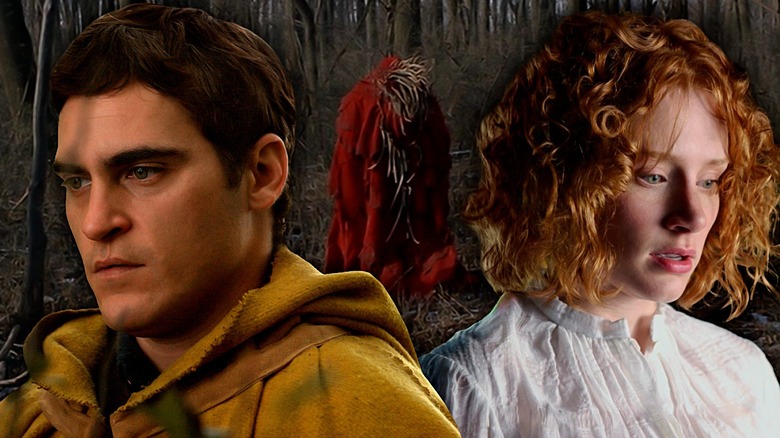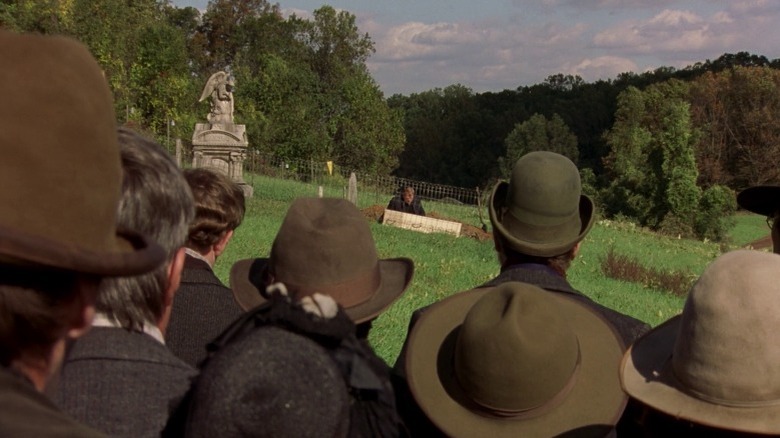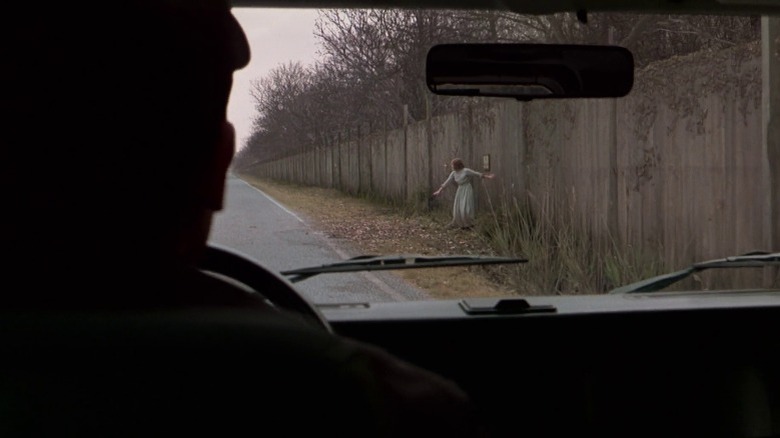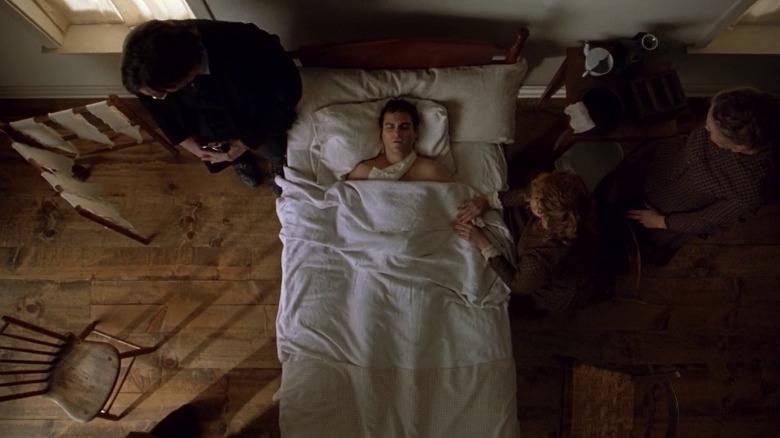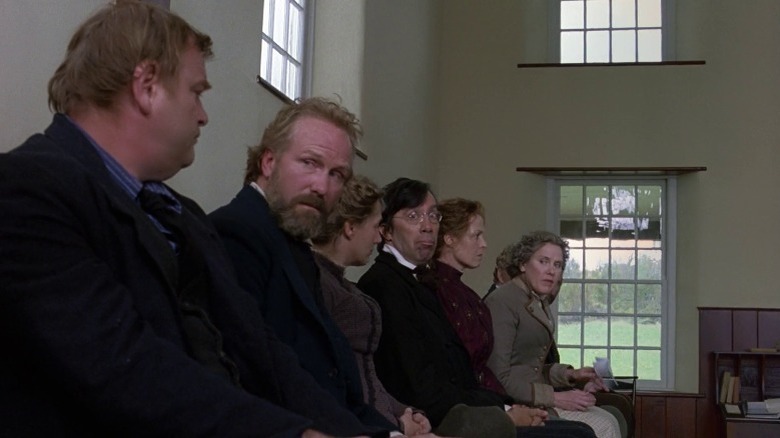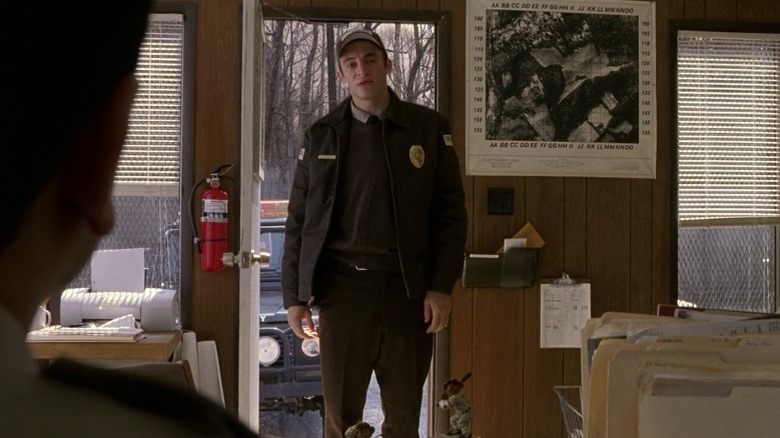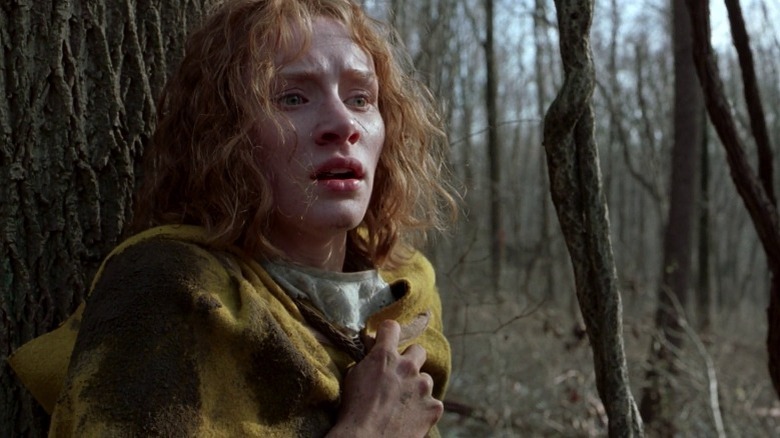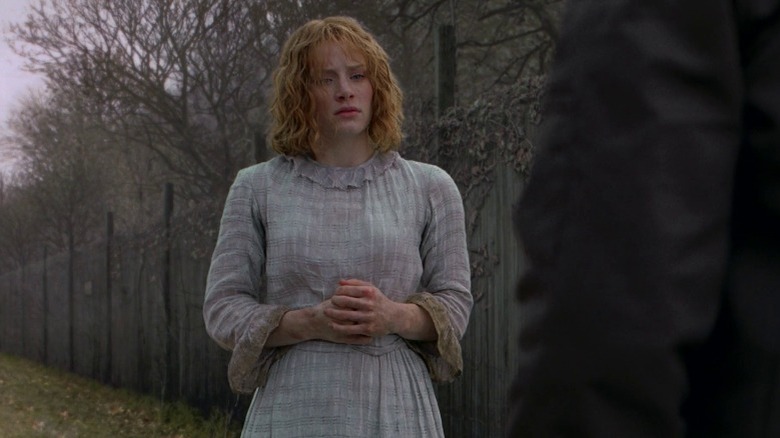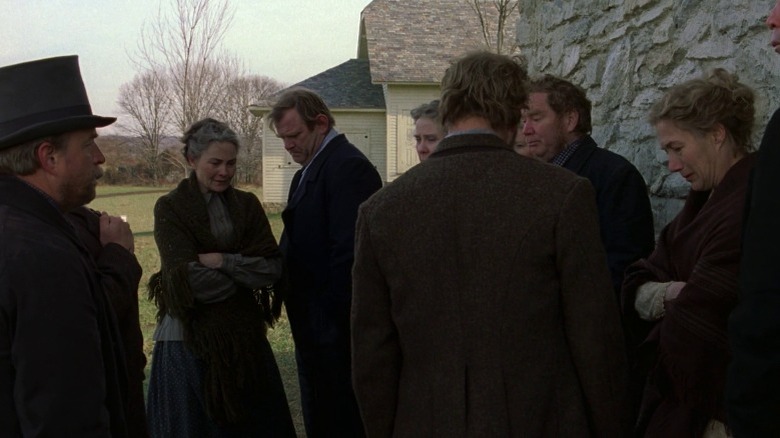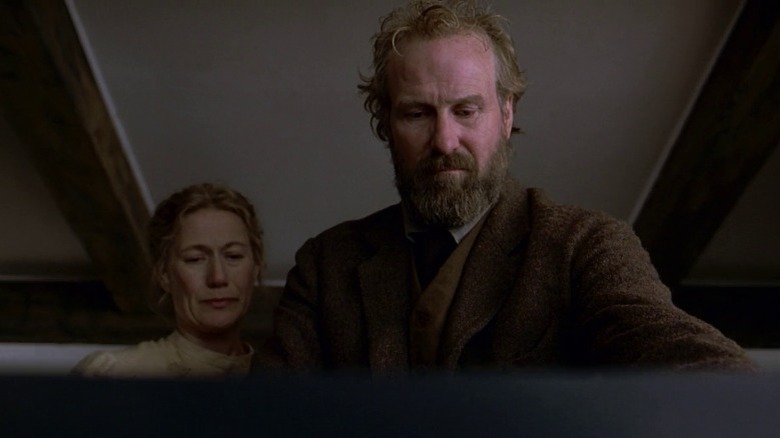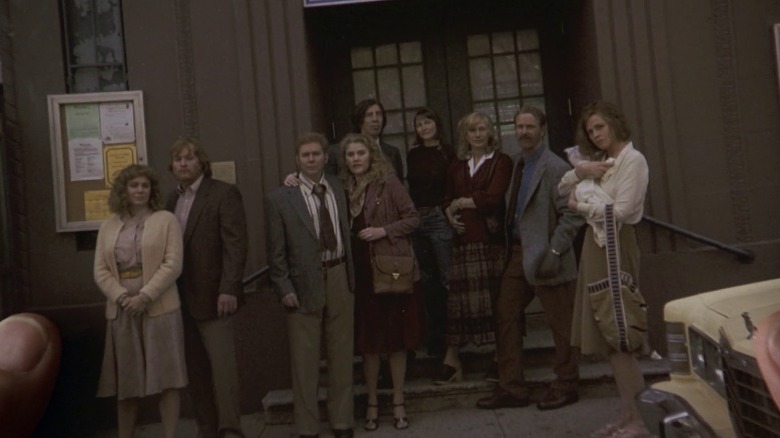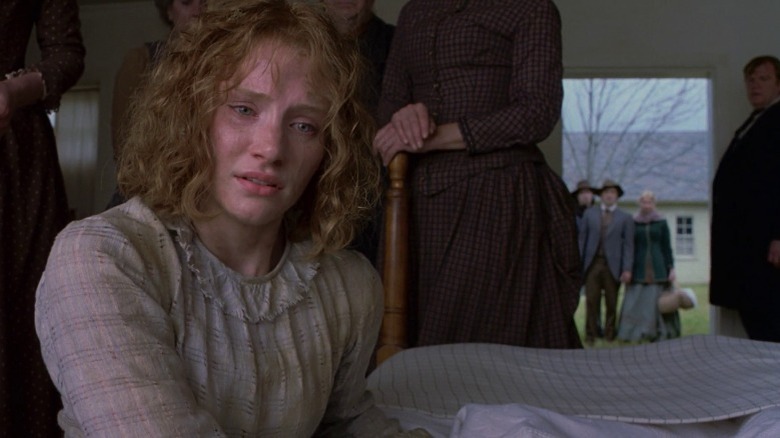The Ending Of The Village Explained
At this point, there have been so many critical and commercial ups and downs in the career of M. Night Shyamalan that it's hard to even pinpoint what the Indian-born American filmmaker's reputation is right now. But one thing's for sure: After 30 years in the game, it's undeniable that Shyamalan is one of the most interesting and exciting filmmakers of his generation — someone capable of stirring interest and fan passion with his most unanimous and most controversial work alike.
And, speaking of controversy, "The Village" may be the single Shyamalan film with the most complicated legacy. Originally released in 2004 to not-terrible reviews, the moody period-drama-meets-creature-horror flick was mocked and admired in equal measure for its positively out-there final twist. But it took years until it started solidifying a reputation among Shyama-stans as one of the suspense maestro's most accomplished, misunderstood, and affecting works. If you've seen it recently, you may be wondering just what the heck was up with that merciless rug-pull of an ending, how on earth it can possibly make sense, and what Shyamalan was trying to get at. To help you understand, here's a detailed breakdown of the "what," "how," and "why" of the ending of "The Village."
Spoilers ahead! If you don't already know the big twist from "The Village," go watch the movie before reading further.
What is The Village about?
"The Village" tells the story of a remote community living in a secluded area deep in the Pennsylvania woods in the late 19th century. The village's small population has virtually no contact with the outside world and lives entirely off of their own agricultural production, which is divided up collectively without the mediation of money or trade. The village's rules are set by the group of secretive older citizens known as elders who founded it decades prior. Although everyone in the village seems to live an idyllic, peaceful lifestyle, they have one problem: The surrounding woods are inhabited by an unknown number of hostile creatures referred to as "Those We Don't Speak Of."
To ward off "Those We Don't Speak Of," the village's residents observe a number of strict rules, such as avoiding the color red, which attracts the creatures. The most important rule, however, is to never leave the village and venture into the woods. As a result of that rule, the village is cut off from the nearby urban areas, known to them as "the Towns." For the most part, residents have become accustomed to the isolation. One day, however, Ivy Elizabeth Walker (Bryce Dallas Howard), the blind daughter of influential elder Edward Walker (William Hurt), becomes dead-set on journeying to the Towns to fetch life-saving medication for her fiancé Lucius Hunt (Joaquin Phoenix), who has been near-fatally stabbed by Ivy's former suitor Noah Percy (Adrien Brody) in a fit of jealousy.
What's the twist at the end of The Village?
There are actually two twists. In the first, simpler one, Edward can't bring himself to leave Lucius for dead, and finally decides to tell Ivy the truth: The creatures don't exist. Their physical appearances actually consist of elders wearing costumes, and all the mythos surrounding them is just a carefully orchestrated way to keep the village's residents from leaving. He instructs Ivy on how to reach the Towns and sends two young men to accompany her to the forest's outer limits; Ivy carries "magic rocks" that will supposedly keep the creatures away, but even that isn't enough to keep her escorts from panicking and going back.
Left alone, Ivy finally reaches the woods' outer limits, where she climbs over a wall. This is where the film reveals that it's actually taking place in the 2000s, not the late 19th century. The village is the creation of a group of people who used to attend a grief support group in a big city together sometime in the 1970s or 1980s and, using the fortune left behind by Edward's wealthy father, endeavored to create a "pure" community insulated from violence and greed. They then found a viable spot in the woods, turned the forest into a walled-off wildlife reserve, built a 19th-century village from scratch using Edward's knowledge as an American History professor, and proceeded to populate the village, presumably with their own children and grandchildren.
How is the plot of The Village resolved?
After climbing over the wall, Ivy encounters park ranger Kevin Lupinski (Charlie Hofheimer) and asks him for help, confused by the sound of his car and never once realizing the truth. Kevin is stunned to learn that Ivy hails from inside the reserve, but decides to help her, going back to his guard shack and quietly fetching medicines without his supervisor (M. Night Shyamalan) noticing. He gives Ivy the medication and helps her over the wall with a ladder. Ivy returns home believing she has simply made a successful visit to the Towns.
The "creature" that attacked Ivy in the forest earlier, only to fall to its death in a hole, is revealed to have been Noah, who escaped from captivity and put on one of the costumes to chase after her. The elders decide to tell the village that Noah was killed by the creatures. To console Noah's grieving parents (Celia Weston and John Christopher Jones), Edward points out that his death allows them to uphold and carry on with the narrative about the creatures and the threat they pose, and therefore, it will keep the village going "if that is something [they] still wish for." Ivy reunites with Lucius, now in possession of the medication that will save his life. In the end, the elders' fear that Ivy's expedition might jeopardize their entire enterprise doesn't materialize, and the film concludes on a hopeful — yet ambivalent — note of return to normalcy.
Why did the elders create the village?
The ending of "The Village" reveals relatively little about the elders' previous lives aside from the basic fact that they all met at a grief support group and all lost loved ones to violent crime. We learn, for instance, that Mrs. Clack's (Cherry Jones) sister was sexually assaulted and killed by a group of men, while Alice Hunt's (Sigourney Weaver) husband was robbed, killed, and had his body dumped in the East River — a piece of information that presumably places their former lives in New York City. Edward, whose father was shot by a business partner following an argument about money, came up with the idea for the village and recruited its founders.
As the film's conclusion draws near, we see the elders discuss the village's ethos and what, if anything, they're accomplishing with it. The main talking point they keep returning to is an idea of "innocence" that must be protected; that "innocence," in fact, is what gets them to accept Edward's decision to let Ivy venture outside in order to save Lucius' life. This indicates that the village was created as a response to the elders' weariness of modern urban life and the horrors they associated with it. They literally walled themselves off from society and, to further protect themselves from violence and inhumanity, they also sought an ideal of societal and moral purity rooted in Edward's historical knowledge, as though American society itself had to be literally reset to basics to be rid of corruption.
How was the farce maintained?
We never actually see what things were like during the village's early years, nor are we told much about that period given that the elders actively refrain from discussing the truth openly. But we get enough hints to form a more-or-less coherent, if fuzzy, mental picture of how such an elaborate farce could be sustainable.
We know that Edward is the heir to a massive family fortune, as his father was extraordinarily wealthy. The Walker estate has been funding the Walker Wildlife Preserve since the village's inception, and the park rangers are expressly tasked with keeping people out, supposedly to protect the "animal sanctuary." Kevin's boss also mentions the fact that people in government were "paid off" to make the reserve a no-fly zone.
The creatures and the various rituals and protocols carried out with the purpose of blocking out the world were all invented by the elders and maintained with a combination of well-designed costumes, dutiful coordination, and efficient fear mongering. As for how the village's population could grow so big and diverse in age starting from such a relatively small group of elders, the movie never entirely explains it. Since we see other elderly and middle-aged people around the village, it could be presumed that more knowing adults were recruited beyond the original nine elders. All in all, though, the village's size is more easily chalked up to a certain measure of fantastical fable logic.
Why did they allow Ivy to go to the Towns instead of going themselves?
The whole plot of "The Village" turns on Ivy's expedition to "the Towns" and the threat it poses to the operation. Edward justifies his rash decision to the other elders by arguing that barring Ivy from saving her fiancé's life would soil the innocence they've worked so hard to uphold. This doesn't entirely make objective sense — it's indicated that plenty of other people had been previously allowed to die by the no-leaving policy — but, ultimately, Edward's peers can't bring themselves to brush off his eagerness to see his daughter happy, and begrudgingly accept the expedition.
Even so, if they were willing to make an exception to save Lucius, why couldn't they have just sent one of their own instead of an oblivious young person who has never known the outside world? The explanation for this seems to be that although the elders are willing to compromise this one time, they still refuse to go so far as to actually leave the village themselves. After nearly three decades of "purity," setting foot outside would mean breaking the village's foundational vow, which they take incredibly seriously exactly because they know how hard it is to uphold. Ivy, meanwhile, has the possibility of fetching the medicine without actually experiencing the outside world to a revelatory degree due to her blindness. In that sense, the additional difficulties she experiences in her journey are an understandable tradeoff for being literally the only person who can both save Lucius while keeping her "innocence" intact.
What does the ending of The Village mean?
Although the finale of "The Village" works plenty well as a simple gut-punch twist, the function that twist serves is far beyond mere narrative pyrotechnics. The entire film is pitched at a strange, eerily artificial register; the lives of the village's residents are depicted with just a tad too much historical fetishism and hazy nostalgia, nearly all their conversations smacking of overwritten period-film preciousness to some degree. The idyll is too much, the beauty is too plain and overbearing, and the values and morals are distressingly simplistic. The film presents a picture-perfect vision of an America that was and makes the viewer realize that there's something unsettling about it.
Then, when the twist arrives, it brings that sense of unease into sharp relief. All the elders' vague conversations about gratefulness, proper manners, commitment to the life they've chosen — suddenly, it all comes together. It becomes clear that the village isn't just a village in a movie; it's the metaphorical framework through which M. Night Shyamalan has elected to investigate deep, complex themes, pertaining to the United States' past and (then-)present as well as to broader existential woes of the 21st century. This is, quite literally, a film about people sequestering themselves in a huge lie in order to avoid dealing with the world as it is. It's a fantasy that many viewers are sure to find both tantalizing and horrifying, if not both at the same time.
The twist is supposed to be improbable
A common criticism that has been lobbed at "The Village" ever since it was released is that its twist "doesn't make sense" — e.g. doesn't hang together logically, creates too many plot holes, or strains suspension of disbelief. On some level, some of those criticisms are inane; as previously mentioned, this film is a fable, and verisimilitude pointedly takes a backseat to emotional clarity and thematic richness from the get-go. But there is truth in the idea that the elders' mass deception doesn't make a lot of sense when you really break it down. And that, in fact, is the point.
When the movie starts, the village has only existed for somewhere between 20 and 30 years, and things are already beginning to feel off: Lucius thinks it's time to venture outside; Noah knows more than he lets on; August Nicholson (Brendan Gleeson) finds himself overwhelmed by grief and sadness once again when the very isolation they've resorted to results in the death of a loved one. The next generation doesn't seem ready to carry on the elders' legacy. When, towards the end, the elders sigh and accept that Ivy's journey might just ruin everything, they're caving in to the sheer exhaustion of having worked hard for decades to make such an absurd idea work. Even if things pan out this time, they can only keep up the ruse for so long, and the film's melancholy comes precisely from that hovering knowledge.
The film is making a point about the nature of nostalgia and reactionary thinking
In a way, the very fact that the village is such a befuddling, unsustainable creation speaks to the desperation that drove its founding. The elders know that they've created something that can't last, but they still cling to it, because they'd rather do that than face the world they've been futilely trying to deny and keep out.
That, incidentally, is just how reactionary thinking works in real life. As a social, cultural, and political stance, the reactionary worldview is always born of a refusal to engage with reality as it is, adapt to it, and accept it. An idealized past is a tantalizing substitute for engagement with a world full of confusion and fear. As an American History teacher, Edward knows that the idyllic rural life he's worked so hard to recreate never really existed in the way that the elders fashion it. First, because, as demonstrated by Noah's crime of passion, humans are always prone to hatred and violence no matter how bucolic their surroundings; second, because even a "peaceful" rural life for American settlers was inevitably founded on oppression, aggression, genocide of natives, patriarchal tyranny, religious fanaticism, and countless other ills.
But even knowing all that, Edward still sells everybody on the ideal, because what matters is the aesthetic of innocence and purity. It's all superficial — it has to be. Surfaces can't hurt or betray the way that real life does. And even if they do, you can always blame the forest creatures.
The elders' implied background is deeply significant
It's telling that the elders are all white, that they're (presumably) New Yorkers, and that what little we see of their faith and religious rituals is superficial and offhanded. These are people dispossessed of a foundation or any sense of community or purpose in life who — in an attempt to replace the complex, real world that they're unable to deal with — can only come up with a shallow facsimile of a world. One of the truly brilliant aspects of "The Village" is that the performances of William Hurt, Sigourney Weaver, Brendan Gleeson et al. never feel 100% convincing before we learn the truth — something always seems off. In the end, that "something" is revealed to be the elders themselves, who are merely play-acting a fake life and twisting themselves into knots trying to believe that there is any truth in it.
But is there truth in the village? No more than there is in a middle-class person's belief that the world's great problem is the existence of crime, rather than the twisted social conditions that lead to crime existing. America was never innocent, and these characters' lives were permeated by violence and injustice, whether it harmed or benefited them, long before they lost any loved ones. To some degree, Edward understands this, as demonstrated by his hatred of money. But even he isn't above exerting patriarchal power over his daughters. It's less a matter of preserving innocence than a matter of focusing on a warped concept of "innocence" as a means of coping with immense grief. Which, again, is very much the point.
In the end, it all goes back to Ivy and Lucius' story
The very last shot of "The Village" is Ivy sitting at Lucius' bedside, holding his hand, and tearfully declaring, "I'm back, Lucius." After so much thematic attention has been paid to the elders and their conundrum, the film ultimately returns to Ivy and Lucius' love story.
This is exactly what makes Shyamalan's filmmaking so unique: He has points to make and questions to ask, no doubt, but he's always attuned to the way that emotional storytelling can be used to get those points and questions across. What makes "The Village" so heartbreaking is that, for as much as we may gripe with the elders' misanthropic rejection of the modern world, their grief and their motivations are intuitively understandable.
In that sense, it's crucial that Ivy and Lucius are revealed to be the film's central focus right to the very end. Even if one were to completely ignore the movie's considerable thematic import, it still works almost irresistibly as the simple story of two young, well-meaning people who just want to be together. There's no telling what will happen to Ivy and Lucius when the farce inevitably falls apart; in trying so hard to shield all these kids from the world, the elders might just have doomed them to a very rude awakening. But this only matters because we, the viewers, want Ivy and Lucius to be happy, to remain loving and kind. Never mind their world; they are real.
